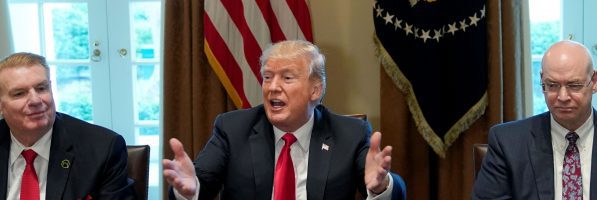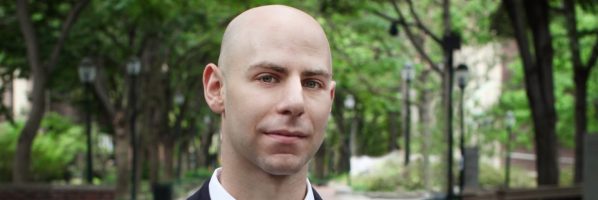Harvard Faculty Discuss Recent Chinese Tariffs, and More – Boston News

Let’s explore some of the most interesting stories that have emerged from Boston business schools this week.
Trade War or War of Words? – Harvard Business School Blog
Following the Trump administration’s recent announcement of 25 percent tariffs on 1,000 Chinese exports, Bill Kirby and Willy Shih, Harvard Business School faculty experts on China, took to the HBS blog to “trade theories on the best path forward for the world’s two largest economies.”
Both experts point to economic shifts in the 1980s, which, not incidentally, was the decade in which Donald Trump started to become a household name. Kirby notes that the major trade distinctions between the United States and Japan, specifically regarding the auto-manufacturing industry, set a precedent. In that, the United States began to firmly invest in Japanese car companies like Honda and Toyota, building their own domestic manufacturing plants. Kirby suspects, however, that the Trump administration may not be as open to that kind of investment. “If Chinese companies wanted to improve access to American markets by investing in the US, would the administration be open to it?” he asks. “They ought to be, in my view. But my suspicion is that that’s not the outcome that this administration is looking for. They’re looking for a miraculous recovery of American-based manufacturing exporting to a Chinese market, not a particularly good match.”
Shih, staying on the topic of the ’80s, offers a different opinion, saying; “I think the real issue is industrial policy on the Chinese side competing with a lack of industrial policy on the U.S. side and the consequences of that. Going back to the mid-1980s, the Chinese government has been mapping a pathway for the country to become a modern country (just as the Koreans, Taiwanese, and the Japanese did before, except on a much larger scale). The Chinese have identified core capabilities that they want to see inside the country, and they’ve been methodically working on that over the last 30-plus years. I’d argue the positive trade balance with the US reflects the progress they’ve made.”
You can read the full conversation between Kirby and Shih here.
An Easy Internship Trick from Kayla Humel ’18 – Simmons Blog
Current Simmons School of Management student body president Kayla Humel, ’18, wrote candidly about the impact of the Student Government Association (SGA) on her recent internship at Puma and future career plans.
“First and foremost, [SGA has taught me] the power of good communication. When the e-board is communicating with one another, event planning is exponentially easier. When SGA is communicating with organizations, processes like budgets occur seamlessly. Good communication is crucial to success in any organization.”
Humel threw her hat in the presidential race because she “saw opportunities to improve processes between SGA and the other organizations on campus. I knew that SGA could create change on campus and I wanted to play a major part in that.”
You ca check out more about her Simmons experience here and watch an interview with Humel about her internship below.
Wield Polarization to Build Positive Change – MIT Sloan Newsroom
MIT Sloan School of Management sustainability initiative director Jason Jay used his recent TEDx talk as an opportunity to share some strategic advice on how to more effectively spark difficult conversations. “The voltage feels so high that we simply avoid conversations out of fear of getting shocked. But I like to think about that polarization as a kind of energy.”
- Draw a contrast between what others might expect you to do and what you’re really trying to do.
- Clarify the values underlying your positions, and do the same with the people you’re talking to.
- Make it clear that you aren’t meeting simply to bargain over these values, but to embrace tension and find new ideas.”
You can check out Jay’s TEDx talk at Hofstra University below and learn more about his work here.
MIT Students Heading to the Vatican, and More – Boston News

Let’s explore some of the most interesting stories that have emerged from Boston business schools this week.
MIT Students Heading to Rome for First Ever Vatican Hackathon – MIT Newsroom
The first of its kind VHacks will take place in Vatican City from March 8-11, bringing in 120 students from various universities around the world to the city-state of the Roman Catholic Church.
“This is not just for the church,” said Sophie Liao, MIT Sloan MBA ’18, in an interview with Meredith Somers from the MIT Newsroom. “This is more about breaking boundaries. Everyone is a migrant, everyone should be involved in this discussion no matter what country they come from.”
“While this is the first event of its kind at Vatican City, using technology to address more than just science isn’t a new thing for the sovereign state’s most famous resident. In a TED Talk last year, Pope Francis suggested how ‘wonderful it would be if the growth of scientific and technological innovation would come along with more equality and social inclusion.'”

Pope Francis made a surprise Ted Talk in 2017, discussing the importance of humility / Photo via Ryan Lash, TED
You can read more about the upcoming VHacks event in Vatican City here.
Sawyer Introduces New Master’s in Marketing – Sawyer Business School
The Sawyer Business School at Suffolk University has announced its new Master of Science in Marketing degree, which prepares students to “approach complex marketing problems, analyze information, and develop high-quality strategic and tactical solutions.”
“Most master’s-level programs in marketing give the qualitative tools pretty short shrift,” says Professor Elizabeth Wilson, chair of the Department of Marketing. “But knowing how to do that kind of research and understanding the whole spectrum of social science research methods is something every employer will value.”

Product management is one of the three concentrations offered in the new Master’s of Marketing program at Suffolk / Photo via nbbj
Three concentrations will be offered as part of the new Master’s program, including: product management, global marketing, and market research and customer insights.
“’I’m excited to see the new MS in Marketing program. The marketing landscape is constantly evolving, and the way brands need to talk to their customers is evolving as well,’ says Victor Davidson, MBA ’12, senior vice president of analytics at SavingStar. ‘The new degree program will empower students to stay on the forefront of these changes and position themselves as top marketers.’”
You can read more about the MSM here.
How News Coverage is Impacting ExxonMobil’s Social Responsibility – Simmons School of Management
Simmons School of Management professor Edward Vieira recently co-authored a study that analyzed ExxonMobil’s corporate social responsibility messages over a 12-year period, from 2002-03, to “determine if there was a relationship between news coverage and subsequent CSR efforts.”
“Corporations that don’t live up to stakeholder expectations may experience a decrease in credibility, reputation, and legitimacy. It’s beneficial for an organization to consistently communicate its CSR actions as well as address culturally relevant events. Therefore, it’s logical that as the world’s fourth largest oil producer, ExxonMobil’s CEO’s letters delivered CSR messages that focused on major external events.”
Read more about Professor Vieira’s research here.
Professor to Know: Alex Edmans, London Business School

There’s one thing that every top business school around the world has in common: impressive faculty. That’s because MBA programs know that their offerings are only as exceptional as their professors, and that’s definitely the case at the London Business School.
Faculty at LBS are at the forefront of innovative business thinking. They’re influential business leaders, managers and policy makers who conduct world-class research and teach topnotch courses. In fact, according to a recent review published in 2014, London Business School received a top four rating for its research performance. And there’s no better representation of LBS’s faculty than finance professor Alex Edmans.
About Professor Alex Edmans
Professor Edmans graduated from Oxford University in 2001 with his bachelor’s degree in Economics and Management. From there, he pursued a career at Morgan Stanley working in investment banking and fixed income sales and trading. Then, a few years later in 2003, he went back to school to receive his Ph.D. in Finance from MIT Sloan as a Fulbright Scholar. In 2007, he became a professor at Wharton, earning his tenure by 2013 before moving to LBS. And, so far, Professor Edmans’ teaching career has been prestigious.
Over the past six years, he’s won 14 teaching awards. At Wharton, he was the highest-rated finance professor in the MBA program before his departure and was even chosen as the Faculty Graduation Speaker to the MBA class of 2014. And then, just this year at LBS, he was given the MBA Class of 2016 teaching award for the highest-rated professor school-wide and the Best Teacher: MBA 2016 award.
Outside of his exceptional teaching, Alex Edmans is a prolific researcher, blogger and Twitter user (you can follow him @aedmans). His blog, Access to Finance, covers a variety of topics and excels at making finance research available to anyone and everyone. It’s written for people with a non-finance background who might not normally be interested in finance but want to stay on top of current trends and events.
As for Edmans’ research, his most recent publication was published in the Journal of Financial Economics on October 27, 2016. Titled “The Source of Information in Prices and Investment-Price Sensitivity,” it discusses the value of financial markets to the real economy. Other research topics have included “Equity Vesting and Investment,” “Blockholders” and “Governing Multiple Firms.”
As you can see by just the most basic facts, Alex Edmans isn’t an ordinary professor. But that’s just the surface. We wanted to get to know Professor Edmans, so we asked him five questions about his life and work as a faculty member at the London Business School.
- What do you love most about teaching at the London Business School?
I really enjoy the diversity of the student body—not just nationalities, but also educational and career backgrounds. This brings lots of different perspectives to class.
I also enjoy the fact that I teach core courses. It’s easy to teach an elective since students have self-selected into the class, so you know they’ll like it. The core is challenging because I teach students who may not like finance, may even be scared of finance, and only take it because they have to. I like this challenge. It means that I have to make finance interesting and accessible, and hopefully, students end up enjoying the class even if they dreaded it to start with.
- What do you hope students take away from your research, teaching, and speaking?
Teaching: I would like students to be able to think for themselves and understand the intuition behind the concepts, which they can apply to any real-world situation—rather than just knowing the formulas that they can plug numbers into in order to solve an exam problem.
Research: The importance of large-scale, rigorous, academic research in a world where policy is increasingly formed on anecdote or myth. That “academic” research isn’t irrelevant but has substantial relevance for the real world.
Speaking: I give a number of talks on personal leadership, not just finance. I would like students to choose careers that are personally fulfilling, rather than just the career that happens to be hot at the moment. And I would like students to be mentally present in everything they do, not just physically present.
- In an era where corporate responsibility is becoming more important than ever, what do MBAs need to know and keep in mind?
That companies should do things for intrinsic and not instrumental value—even if there is no clear profit benefit for an action. This applies to your personal life too—to help a classmate even if you don’t clearly benefit from it, or learn something even if it won’t be on the exam.
- Which of your blogs would you most recommend for MBAs to read?
My blog, Access To Finance, aims to make finance accessible to a general audience by taking complex academic papers, or topical issues (such as Brexit or the current debate on executive pay), and making them simple. Which articles in the blog to read depends on the MBA’s interest, and so it’s hard for me to recommend some over others. My Twitter feed @aedmans also aims to showcase simple, accessible articles on real world finance.
I would also recommend two talks that I gave which may be of particular interest to MBAs. One is my TEDx talk, “The Social Responsibility of Business”, on the business case for sustainability, and the other is “Fulfilling Careers and Full Lives”, the final lecture of my MBA course, which is similar to a graduation speech in that it provides general advice for how MBAs can make the most of their talents and opportunities to serve society, but aims to do so in a concrete and actionable rather than sugary and saccharine way.
- What makes your teaching/classes different at LBS?
In every class, I have an “extra-curricular break,” which takes a complex academic paper with real-world relevance and makes it accessible for a practitioner. Indeed, my blog spun out of these extra-curricular breaks.
- While a core class is theoretical and rigorous, I always try to emphasize the evidence to the real world, drawing from my own practitioner and policy experience.
- I cold-call students. This is absolutely not to scare them, but to keep the class interactive and the students engaged, and to give the students practice in solving problems themselves, rather than just following someone else. It also ensures the pace of the class is not dictated by the students with finance backgrounds; cold-calling means that a broad set of students end up contributing.
- I play music before class and during the breaks, and dress down. This is absolutely not intended to be a gimmick. Instead, it is to conduct class in as relaxed an atmosphere as possible, to make students relaxed about asking questions and not be afraid to be cold-called. The music aims to bring energy to the class, which is particularly important when studying finance at 8:15 am on Monday morning!
Professor Profile: Adam Grant, Wharton

When attending Ivy league schools like The University of Pennsylvania’s Wharton School of Business, students are guaranteed to have professors with impressive resumes leading lectures and projects. One such professor at Wharton is Adam Grant, 34, who is a New York Times best-selling author as well as the youngest tenured professor at the renowned business school. Continue reading…
